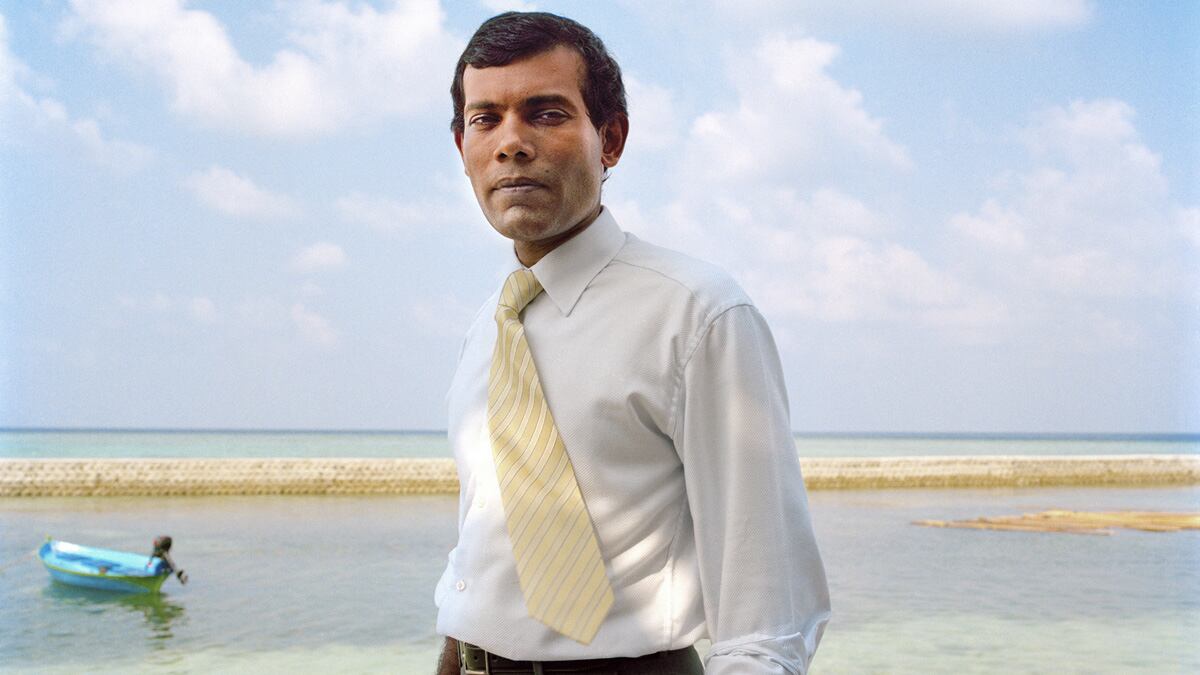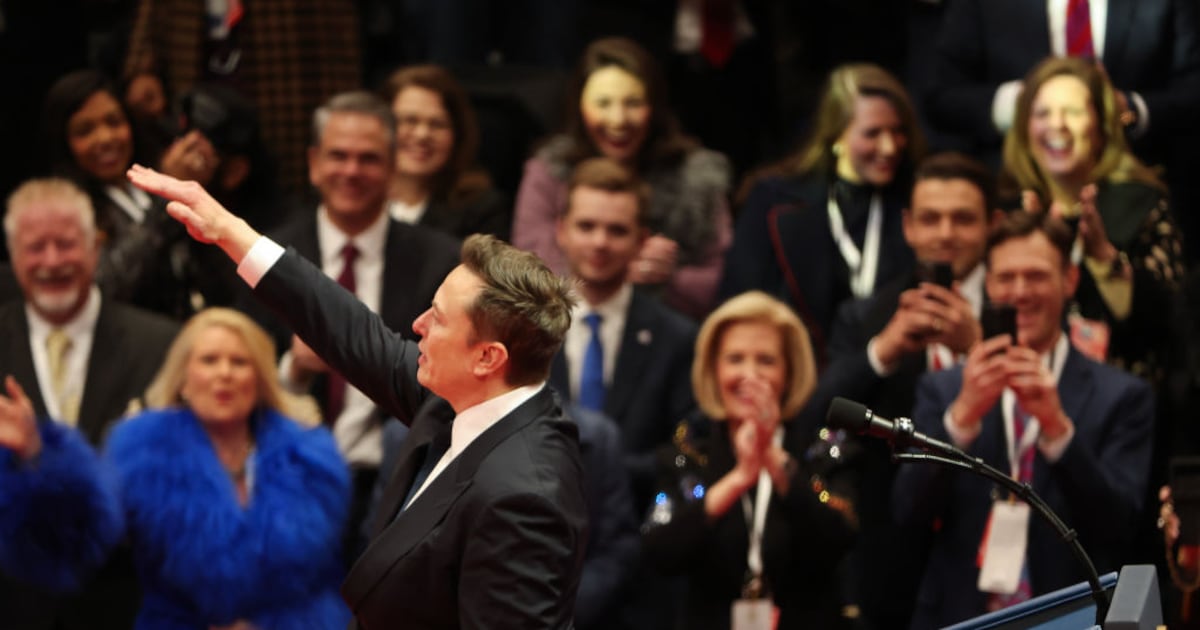It’s hard to think of any documentary film that depended on unfettered access to a sitting head of state. Several films have been made about world leaders after they retired or died. But in The Island President, director Jon Shenk wanted to make a film about the newly elected president of the Maldives, Mohamed Nasheed, just after he took office. And he knew that he was envisioning something unprecedented. “It’s like an uncensored, real-life version of The West Wing,” Shenk comments.
The Island President also fits into the recent genre of documentaries—launched by the Oscar-winning An Inconvenient Truth—that call attention to the mounting dangers of climate change. The Maldives, an archipelago of some 2,000 islands in the Indian Ocean, sit at sea level and are in danger of becoming uninhabitable as the oceans rise. The spectacular cinematography of these lush islands gives a certain grandeur to this document of a natural world in peril. But the unique element of this addition to the cinema of global warming is its intimate focus on the man who brought the Maldives’ crisis to the world’s attention.
Shenk says he recognized the potential of this story when he read about Nasheed’s election as the first democratic head of a country that had been ruled by a brutal dictator, Maumoon Abdul Gayoom, for the past 30 years. “Right off the bat he started talking about the environmental crisis,” Shenk says, “and that just popped off the page. Nasheed helped me to think about climate change in a new way. There are basically two groups—the deniers on the one side or the wonky science experts on the other side. But Nasheed helped us to see that this is really a human rights struggle as well as a scientific issue.”
The director imagined that a film about Nasheed could bring a fresh approach to a hot-button issue, and he knew he needed to start work immediately. But he also knew that he needed unimpeded access to Nasheed, and he was uncertain that would be permitted. He raised the money to go to the Maldives, and he hoped that he would be able to persuade the president to allow him to stay.
President Nasheed did not initially realize that Shenk intended to make a feature film. “Very soon after the elections,” Nasheed recalls, “there were a lot of journalists chronicling what we were doing. After a while, all the other cameras left, and Jon was still there. He ended up staying for almost a year. Having cameras around is never comfortable, but I trusted Jon, and I’m glad I did. Sometimes it works out when you trust people, and sometimes it doesn’t, as I found out with our vice president.”

Indeed the story of Nasheeed’s crusade has a sad postscript. Nasheed was forced to resign the presidency in February, under pressure from the military leaders loyal to the former dictator, who threatened widespread slaughter if he did not step down. Nasheed’s vice president, Mohamed Waheed Hassan, took over the government, with the support of Gayoom and his followers. “The old dictatorship is back,” Naseed asserts, “but we are going to try to force new elections.”
Whatever happens in the Maldives in the upcoming months, the film chronicles a remarkable transformation in the country after decades of dictatorship. Nasheed himself had been a reformer who was imprisoned and tortured on a number of occasions before public protests finally forced free elections in 2008. In his mind, the issues of democracy and climate change are inextricably intertwined. “People in the Maldives were aware of the climate issues under the dictatorship,” Nasheed points out, “but it’s hard to make much headway with the rest of the world if you don’t have the moral high ground.” A democratically elected president simply carried more weight on the world stage. Soon other world leaders began to pay attention to the dangers that Nasheed identified.
Just as Nasheed fought an uphill battle in bringing his environmental concerns to the rest of the world, Shenk faced a number of obstacles in bringing the film to completion. The first requirement was that he had to retain his independence, and President Nasheed did not try to control or censor the film. Nasheed did not even see the film until it played at the Toronto Film Festival last fall. A bigger problem for Shenk was being allowed to film Nasheed’s meetings with other heads of state. Shenk did not have unlimited access during these encounters, but he kept the cameras rolling until he was literally kicked out of the room. “We were able to film Nasheed sitting across the table from the chief climate negotiator in India,” Shenk says. “I loved capturing their conflict.”
Another issue was the filmmaker’s uncertainty about how Nasheed’s quest would play out. Shenk knew that the president planned to attend the climate summit in Copenhagen in December 2009, but as he says, “We weren’t sure if he would have a voice there. We knew that other world leaders were paying attention to him, but we never thought he’d be at the table with Obama and Angela Merkel and Sarkozy. Yet he was right there with them.”
In Copenhagen these world leaders did agree to reduce global emissions, and if their promises haven’t been carried out yet, Nasheed and Shenk both feel that the symbolic victory was not a hollow one. “Politicians will do what people tell them to do, and people in the industrial countries must speak up,” Nasheed says. “I hope and believe that Jon’s film will raise awareness in the United States.”
When Nasheed saw The Island President in Toronto, it more than lived up to his expectations. “It was much better than I thought it would be,” he declares flatly. “It had almost a thriller component in building up to the conference in Copenhagen. And the spectacular cinematography of our country was something I hadn’t really imagined.” Nasheed was also in New York for the film’s opening this week and even appeared on the Letterman show to discuss it.
Yet the return of the dictatorship in the Maldives inevitably adds a sour aftertaste to the film. Shenk observes that there were ominous hints even while they were filming in the Maldives. “When you’re there, you do feel the shadow of all those years of dictatorship,” he says. “People in cafes were talking in whispers in case someone was listening.”
Still, he takes a measure of comfort from Nasheed’s own sense of guarded optimism. “Every time we fall, we bounce back,” Nasheed says. “I was elected ward secretary, then arrested. When I got out of prison, I was elected to another post and then arrested again. And they finally elected me president. I’m optimistic that we can work against the odds and come back.”
Shenk echoes the sentiment. “Nasheed’s attitude is that we lost this battle, but we will live to fight another day,” he says. “It’s nice to dream of a world full of Nasheeds.”






